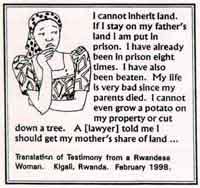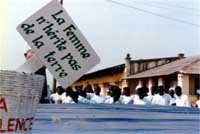April 2002 - Eliminate Poverty in All Stages of Life
 |
|
Access to means of meeting
|
Women's invisible work must be denounced for it to be recognized and included in the statistics reflecting a country's wealth. It must also be denounced because all rights associated with it are trampled on. Women produce wealth but do not possess it. Land is in the hands of large landowners-which is why Colombian women called for land reform and Brazilian women insisted that women's role in the reform process must be strengthened. Haitian women advocated a "true reform that will allow women and men farmers to have access to land and all the resources needed to obtain a substantial yield." Access to land appeared in many national platforms (Benin, Cameroon, Cyprus, Ghana, Mexico, El Salvador, Togo, Venezuela), and Honduran women observed that women's poverty stems from a bad distribution of wealth. |


Access to land is a matter of survival for women.
|
Often when small farmers manage to have a piece of land of their own, their wives are not entitled to inherit it because the land stays in the husband's family after his death. The question of land inheritance is crucial to many women's survival.
This is an important issue in India, and women activists included it in the measures to eradicate violence against women. They demanded women's right to land, water, forests and the free use of these resources to ensure their economic independence. They also asserted that women's ancestral right to property must be guaranteed over and above any clause in a will that would deprive them of their inheritance.
In Mozambique, the women on the March recommended that the government include in its new family law women's right to keep their possessions and land in the event of their husband's death, or if they themselves are repudiated.
In Mali, the need to facilitate women's access to land ownership was coupled with that of providing women with access to technical and technological training, means of production and credit.
Creating our own resources
The word went out and was echoed in many places: women must have access to financial resources to ensure their economic development. "Women must be able to access credit more readily and popular banks must be set up," the Chadian platform read.
In Congo Brazzaville, women demanded that a women's development bank be established to promote economic and social activities. The need for loans at affordable rates was expressed by the women of Benin, Burkina Faso, Cape Verde, the Central African Republic, Ecuador, Ghana, Mali, India, Togo, and Venezuela.
European women stated that they wanted their governments to exert pressure on the international scene to cancel the debt of poor countries, "while assuring political rights and the right to information," said the Belgian women; to them denying these rights meant that women were excluded from "decisions on the distribution of property."
|
|
Copyrights
:
CC by-nc-sa 2.0
Last modified 2006-03-23 03:09 PM This item is available in Français, English, Español |



